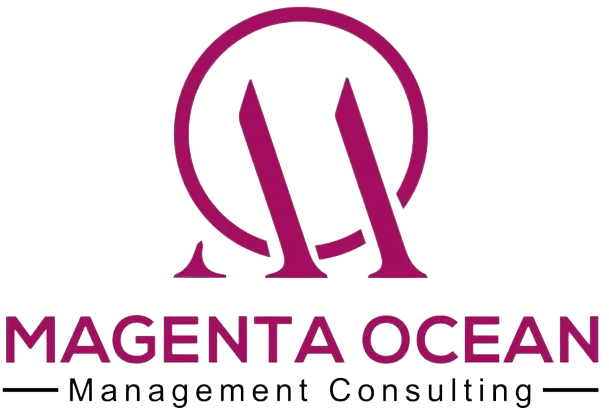
- Unlocking the Potential of Your SMB: How Magenta Ocean Management Consulting Can Boost Your Organizational Performance
- Definition and significance of management consulting in organizational performance improvement.
- Understanding the Role of Management Consulting
- Explicating the role of consultants as objective advisors, offering expertise and strategic insights.
III. Enhancing Decision Making Processes
- Discussing how consultants provide data-driven analysis, aiding informed decision making and mitigating risks.
- Optimizing Operational Efficiency
- Exploring methods employed by consultants to identify inefficiencies, streamline processes, and improve productivity.
- Drivig Organizational Change
- Analyzing the consultant’s role in facilitating successful change initiatives through effective communication and stakeholder engagement.
- Maximizing Employee Performance and Engagement
- Examining strategies utilized by consultants to enhance employee satisfaction, motivation, and overall organizational culture.
Introduction
The ability to enhance organizational performance is a constant pursuit for businesses seeking sustainable success in today’s dynamic and competitive landscape. While numerous strategies have emerged over time, one theory that has gained considerable attention is the potential of management consulting to significantly boost organizational performance. This article aims to investigate the truth behind this theory by exploring the various ways management consulting can positively impact an organization, ranging from strategic decision-making support to improving operational efficiency. By delving into empirical evidence and examining real-life case studies, we aim to engage readers with a critical analysis of how management consulting can potentially drive transformative change within organizations.
Understanding The Role Of Management Consulting
Understanding the role of management consulting is crucial for organizations aiming to boost their performance. Management consulting involves the engagement of external experts who provide valuable insights and guidance to improve various aspects of an organization’s operations, strategy, and overall effectiveness. By understanding how management consulting can contribute to organizational success, leaders can make informed decisions regarding whether or not to engage such services. This section will explore the different ways in which management consulting can enhance decision making processes within organizations.
Enhancing Decision Making Processes
Enhancing decision making processes is a crucial aspect of management consulting. By analyzing and evaluating various options, management consultants provide valuable insights to organizations regarding the most effective decision-making strategies. Through their expertise in data analysis and industry knowledge, consultants can identify potential risks and opportunities that may have been overlooked by internal stakeholders. Additionally, they facilitate discussions among key decision-makers, ensuring that all perspectives are considered before arriving at a conclusion. Consequently, implementing recommendations from management consultants can significantly improve an organization’s decision-making capabilities and ultimately enhance its overall performance. This leads us to the subsequent section on optimizing operational efficiency.
Optimizing Operational Efficiency
Optimizing operational efficiency is a critical aspect of organizational performance, and management consulting plays a crucial role in achieving this goal. By utilizing the expertise and experience of consultants, companies can identify inefficiencies within their operations and implement strategies to streamline processes. However, some may argue that optimizing operational efficiency solely through internal efforts is sufficient. While it is true that organizations can make improvements on their own, the specialized knowledge and external perspective offered by management consultants can provide unique insights and innovative solutions that may not be readily apparent from an internal standpoint.
One way in which management consulting enhances operational efficiency is by conducting thorough analyses of existing processes and systems. Consultants are trained to identify bottlenecks, redundancies, and other areas for improvement within an organization’s operations. Through careful examination of data and observation of day-to-day activities, they
can pinpoint specific areas where changes can be made to enhance efficiency. These findings enable organizations to prioritize initiatives effectively and allocate resources efficiently.
Moreover, management consultants bring valuable expertise from working with various clients across different industries. This breadth of experience allows them to draw upon best practices and successful strategies employed elsewhere when developing recommendations tailored to a particular organization’s needs. By leveraging this external knowledge base, companies can avoid reinventing the wheel and instead learn from others’ successes or failures.
Additionally, management consulting fosters collaboration between different departments within an organization. Often, different teams operate in silos without full visibility into each other’s work. Consultants facilitate cross-functional communication by bringing together stakeholders from all relevant departments during the optimization process. This collaborative approach ensures that potential barriers or conflicts between different functions are identified early on and resolved through joint decision-making.
In conclusion (don’t use ‘in conclusion’), optimizing operational efficiency through management consulting provides organizations with invaluable benefits such as improved decision making processes discussed previously (H2). Additionally (transition), driving organizational change – our next focus area – becomes more achievable when foundational elements like efficient operations are in place. With the optimization of operational efficiency as a cornerstone, organizations can effectively implement and sustain broader changes to their structure, culture, or strategies.
Driving Organizational Change
The current heading, “driving organizational change,” focuses on the role of management consulting in facilitating and guiding significant transformations within an organization. Management consulting plays a crucial role in driving organizational change by providing expert advice, analysis, and recommendations to enhance overall performance. Consultants assist businesses in identifying areas for improvement, developing strategic plans, and implementing necessary changes. By leveraging their expertise and experience, consultants help organizations navigate through complex challenges and transitions, ultimately leading to enhanced efficiency and effectiveness. Furthermore, this section will explore how management consulting aligns with the objective of maximizing employee performance and engagement in order to achieve sustainable success.
Maximizing Employee Performance And Engagement
Maximizing employee performance and engagement is a crucial aspect of organizational success. To achieve this, management consulting plays a significant role by providing valuable insights and strategies to enhance the overall effectiveness of an organization’s workforce. By utilizing their expertise in various areas such as talent management, leadership development, and performance evaluation, management consultants can help identify potential barriers or gaps that hinder employee performance. Furthermore, they assist in
designing tailored solutions that are aligned with the organization’s goals and values. Through implementing these recommendations, organizations can optimize employee productivity, motivation, and satisfaction.
In addition to identifying barriers and developing customized strategies, management consulting also fosters employee engagement within an organization. Consultants work closely with both employees and leaders to create a culture that encourages open communication, collaboration, and innovation. They facilitate workshops or training sessions to improve team dynamics, problem-solving skills, and decision-making processes. Moreover, consultants provide guidance on establishing effective feedback mechanisms to ensure continuous improvement at all levels of the organization. This emphasis on fostering engagement not only enhances individual job satisfaction but also strengthens teamwork and loyalty among employees.
Furthermore, management consulting offers objective evaluations of individual performances through comprehensive assessments and data analysis methods. These evaluations enable organizations to recognize high-performing individuals who deserve appreciation or rewards while identifying areas for improvement for those who may require additional support or development opportunities. Additionally, management consultants provide tools and techniques to track key performance indicators (KPIs) consistently over time. This allows organizations to monitor progress towards set objectives effectively and make necessary adjustments when required.
To sum up, management consulting plays a pivotal role in maximizing employee performance and engagement within an organization. By offering expert insights into talent management practices, leadership development programs, and performance evaluation methodologies; consultants help identify barriers hindering productivity while proposing effective solutions tailored to the unique needs of each organization. Furthermore, they foster a positive work environment by encouraging open communication channels between employees at all levels while promoting collaboration and innovation throughout the organization. Additionally, consultants provide objective evaluations and data-driven analysis to assess individual performances accurately. Therefore, organizations that leverage management consulting services are likely to experience improved employee performance, increased engagement levels, and ultimately achieve better overall organizational outcomes.
Conclusion
Upon a rich tapestry of knowledge and experience, management consulting emerges as an indispensable catalyst for organizational success. Like skilled conductors leading harmonious symphonies, consultants guide businesses towards excellence by enhancing decision-making capabilities, optimizing operations, driving transformative change, and nurturing a workforce that thrives with passion, an orchestra poised to conquer new horizons together.





